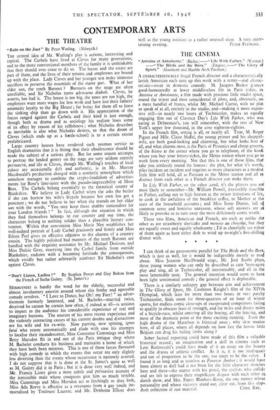CONTEMPORARY ARTS
THE THEATRE
"Rain on the Just" By Peter Wading. (Aldwych.)
THE central idea of Mr. Watling's play is serious, interesting and topical. The Carbels have lived at Cleves for many generations, and to the more conventional members of the family it is unthinkable that they should ever cease to do so. The house and the estate are part of them, and the lives of their tenants and employees are bound up with the place. Lady Cleves and her younger son make immense sacrifices to preserve the essentials of the status quo. What of her elder son, the tenth Baronet ? Baronets on the stage are often unreliable, and Sir Nicholas turns advocatus diaboli. Cleves, he asserts, has had it. The house is too big, the taxes are too high, the employees want more wages for less work and have lost their fathers' axiomatic loyalty to the Big House ; far better for them all to leave the sinking ship than go down with it. His appreciation of the forces ranged against the Carbels and their kind is just enough, though both as drama and as sociology his realism loses some of its effect by reason of his selfishness ; what Nicholas describes as inevitable is also what Nicholas desires, so that the doom of Cleves (which ends up as a battle-school) is to a certain extent prefabricated.
Large country houses have rendered such yeoman service to English dramatists that it is fitting that their obsolescence should be made the subject of a serious play. But for some reason attempts to portray the landed gentry on the stage are very seldom entirely persuasive, and life at Cleves, though Mr. Watling's touches of local colour are occasionally deft and authentic, is in Mr. Murray Macdonald's production charged with a synthetic atmosphere which somehow manages to combine the crypto-feudalism of advertise- ments for Rose's lime-juice with the pseudo-impeccability of Moss Bros. The Carbels belong essentially to the theatrical county of Blankshire. We believe in Lady Carbel when she asks the butler if she can borrow his wife's bicycle because her own has got a puncture ; we do not believe in her when she rounds on her elder son with the words, " You may keep those shabby innuendoes for your London friends ! " In fact, although the situation in which they find themselves belongs to our country and our time, the characters belong to nothing solider than a plausible literary con- vention. Within that convention Miss Marie Ney establishes her well-judged portrait of Lady Carbel graciously and firmly and Miss Eileen Peel gives an effective edginess to the charms of a country cousin. The highly polished bad manners of the tenth Baronet are handled with the requisite assurance by Mr. Michael Denison, and Miss Dulcie Gray, marrying into the Carbel family from outside Blankshire, endures with a becoming fortitude the consequences, which vividly but rather arbitrarily reinforce Sir Nicholas's case against Cleves.


































 Previous page
Previous page